CORPORATE ACTION: Clorox
US Plastics Pact 2021 Report Highlights Sustainability Achievements Of Members
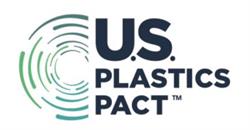 Member organizations of the U.S. Plastics Pact account for 37 percent, or 5.9 million tonnes, of plastic packaging in the U.S. by weight. Data from the organization’s 2021 Annual Report revealed the creation of the Target 1 Problematic and Unnecessary Materials List and the improvement in design of recyclable, reusable, refillable and compostable plastic packaging by recognizing leading performers through the group’s Sustainable Packaging Innovation Award. Also, members have recorded an increase in the use of post-consumer recycled content in plastic packaging, with members having an average of 8 percent PCR or responsibly sourced bio-based content.[Image Credit: © U.S. Plastics Pact]
Member organizations of the U.S. Plastics Pact account for 37 percent, or 5.9 million tonnes, of plastic packaging in the U.S. by weight. Data from the organization’s 2021 Annual Report revealed the creation of the Target 1 Problematic and Unnecessary Materials List and the improvement in design of recyclable, reusable, refillable and compostable plastic packaging by recognizing leading performers through the group’s Sustainable Packaging Innovation Award. Also, members have recorded an increase in the use of post-consumer recycled content in plastic packaging, with members having an average of 8 percent PCR or responsibly sourced bio-based content.[Image Credit: © U.S. Plastics Pact]
CORPORATE ACTION: Colgate
Colgate-Palmolive Executive Claims Sustainability Can Help Profitability

Colgate-Palmolive Chief Sustainability Officer Ann Tracy discussed new tactics and models for improving a company’s profitability while working to improve sustainability. She said there are two ways that brands can care for the environment while providing value to shareholders. For example, Colgate chose to focus on areas where it has excellence and expertise, and also the company decided to work with other companies and organizations. She said her company believes that brand owners should take responsibility for the full life cycle of their products.[Image Credit: © Colgate-Palmolive Company]
CORPORATE ACTION: Henkel
Single-Material PE Pouch Offers Recyclability With Barrier Properties
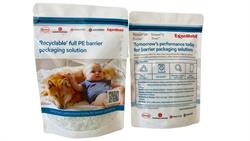 ExxonMobil, Henkel, Kraus Folie, Siegwerk and Windmöller & Hölscher have collaborated to develop a 100 percent recyclable single-material PE pouch with packaging-related properties similar to hard-to-recycle multi-material laminated pouches. The new pouch offers packaging applications that have a high oxygen barrier level, strong package integrity and outstanding shelf appeal. Siegwerk’s delamination and deinking primer technology was used to enable the production of colorless recyclate. Also, high oxygen barrier was achieved by using Loctite Liofol BC 1582 RE coating from Henkel and Cirkit OxyBar BC 1582 from Siegwerk.[Image Credit: © Windmöller & Hölscher]
ExxonMobil, Henkel, Kraus Folie, Siegwerk and Windmöller & Hölscher have collaborated to develop a 100 percent recyclable single-material PE pouch with packaging-related properties similar to hard-to-recycle multi-material laminated pouches. The new pouch offers packaging applications that have a high oxygen barrier level, strong package integrity and outstanding shelf appeal. Siegwerk’s delamination and deinking primer technology was used to enable the production of colorless recyclate. Also, high oxygen barrier was achieved by using Loctite Liofol BC 1582 RE coating from Henkel and Cirkit OxyBar BC 1582 from Siegwerk.[Image Credit: © Windmöller & Hölscher]
CORPORATE ACTION: McDonald’s
McDonald’s Promises To Come Up With Focused Report On Reusable Packaging
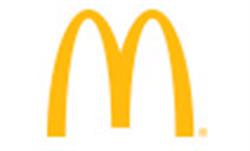
McDonald’s Corporation has committed to “evaluate and report” on the implications of ending its use of single-use packaging and switching to reusable packaging. Such reports will include a look at the opportunities and risk, as well as impacts linked to single-use plastic and other single-use packaging and on the environment. [Image Credit: © McDonald's]
CORPORATE ACTION: Nestlé
Nestlé Indonesia Tests In-Store Refillable Vending Machines
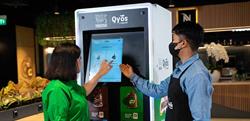 Nestlé has partnered with Qyos by Algramo to test refillable vending machines for its Milo and Koko Krunch products at two local retailers in Indonesia. The pilot will run for four to six months and will allow consumers to buy containers at the locations or bring their own. Nestlé R&D centers in Singapore and Switzerland collaborated with their counterparts in Indonesia, designing the program to help eliminate the need for disposable packaging.[Image Credit: © Nestlé]
Nestlé has partnered with Qyos by Algramo to test refillable vending machines for its Milo and Koko Krunch products at two local retailers in Indonesia. The pilot will run for four to six months and will allow consumers to buy containers at the locations or bring their own. Nestlé R&D centers in Singapore and Switzerland collaborated with their counterparts in Indonesia, designing the program to help eliminate the need for disposable packaging.[Image Credit: © Nestlé]
CORPORATE ACTION: PepsiCo
PepsiCo Tests Paper-Based Recyclable Packaging For Walkers Snacks
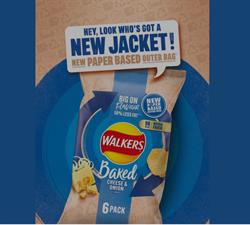
PepsiCo is piloting a paper-based packaging for multipacks of Walkers Baked savory snacks in the U.K. Launched at the start of March 2023, the test run aims to evaluate the feasibility of replacing plastic packaging with recyclable packaging. The trial is at 800 Tesco store locations and covers more than 300,000 six-pack multipacks of the Sea Salt and Cheese and Onion variants of the snack. Results of YouGov Profiles study have shown that 52 percent of Walkers’ customers try to reuse disposable items, such as plastic bags, compared with 56 percent of the U.K. population.[Image Credit: © PepsiCo]
CORPORATE ACTION: Procter & Gamble
P&G Reveals Progress Toward 2030 Plastic Reduction Goals
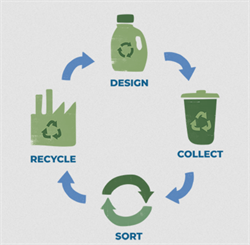
Procter & Gamble has provided updates on its progress toward achieving its 2030 sustainability goals as of 2023. The company said its manufacturing locations across more than 35 countries “send zero-manufacturing waste to landfill”, and that 79 percent of consumer packaging is recyclable or reusable, compared with 100 percent by 2030. Also, the company said it has achieved an 8 percent reduction in use of virgin petroleum-based plastic, compared with its 50 percent goal.[Image Credit: © Procter & Gamble]
P&G’s Packaging Innovations Help Consumers Become More Environment-Friendly
.png&width=250&height=250)
Several award-winning packaging designs and innovations from Procter & Gamble can help consumers make their homes more environment friendly. These include the Ariel ECOCLIC box cardboard packaging made with FSC-certified materials and the Herbal Essences bio:renew shampoo with Eastman ReNew molecular recycled plastic packaging. P&G’s Lenor in-Wash Scent Booster Cardboard Pack comes in packaging made with 40 percent recycled fibers.[Image Credit: © Procter & Gamble]
CORPORATE ACTION: Tesco
Scientists Claim Tesco’s Biodegradable Teabags Are Not Compostable
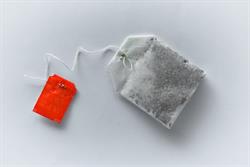 A group of scientists filed a complaint with Ireland’s Competition and Consumer Protection Commission against Tesco, accusing the retailer of greenwashing. According to University College Cork researcher Alicia Mateos- Cárdenas, Tesco Finest Green Tea teabags did not break down after they were buried in garden soil for a year. Tesco rejected the scientists’ claim of false advertising and claimed that the teabags made from plant-based polylactic acid are designed to be commercially composted.[Image Credit: © Lynda Sanchez on Unsplash]
A group of scientists filed a complaint with Ireland’s Competition and Consumer Protection Commission against Tesco, accusing the retailer of greenwashing. According to University College Cork researcher Alicia Mateos- Cárdenas, Tesco Finest Green Tea teabags did not break down after they were buried in garden soil for a year. Tesco rejected the scientists’ claim of false advertising and claimed that the teabags made from plant-based polylactic acid are designed to be commercially composted.[Image Credit: © Lynda Sanchez on Unsplash]
CORPORATE ACTION: Unilever
Persil Adds QR Codes To Enhance Accessibility Of Packaging
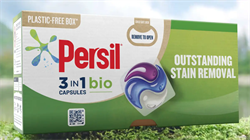 Persil has made the plastic-free packaging of its laundry capsules and the brand’s Ultimate Liquids product line more inclusive by adding Accessible QR codes. The AQR codes were developed in partnership with augmented reality specialist firm Zappar and in collaboration with the Royal National Institute of Blind People. Zappar’s AQR codes enable brands to provide accessibility to blind consumers, using their existing code scheme, and without a need for extra space on packaging.[Image Credit: © Unilever]
Persil has made the plastic-free packaging of its laundry capsules and the brand’s Ultimate Liquids product line more inclusive by adding Accessible QR codes. The AQR codes were developed in partnership with augmented reality specialist firm Zappar and in collaboration with the Royal National Institute of Blind People. Zappar’s AQR codes enable brands to provide accessibility to blind consumers, using their existing code scheme, and without a need for extra space on packaging.[Image Credit: © Unilever]
Unilever Study Shows Influencers Can Turn People To The Green Side
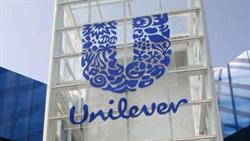 Social media influencers can help convince consumers to make environment-friendly choices. Results of a study by Unilever and Behavioural Insights Team showed influencers have the greatest impact on 78 percent of respondents, compared with 48 percent for TV documentaries and 37 percent for news articles. Also, 83 percent of respondents believe TikTok and Instagram are helpful sources of information on how to be more environment-friendly at home.[Image Credit: © Unilever]
Social media influencers can help convince consumers to make environment-friendly choices. Results of a study by Unilever and Behavioural Insights Team showed influencers have the greatest impact on 78 percent of respondents, compared with 48 percent for TV documentaries and 37 percent for news articles. Also, 83 percent of respondents believe TikTok and Instagram are helpful sources of information on how to be more environment-friendly at home.[Image Credit: © Unilever]
CORPORATE ACTION: Other
Plastic Bank Indonesia Reaches 40M KG Milestone In Collecting Plastic Waste
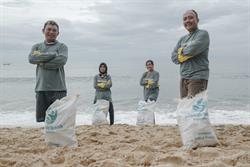 Plastic Bank Indonesia said it has collected 40 million kilograms of plastic waste that otherwise would have entered the ocean, as of March 16, 2023. This amount of plastic is equivalent to 2 billion single-use 500ml PET bottles. Plastic Bank Indonesia’s social enterprise has worked with local community members who collect and exchange plastic waste at collection branches for cash and “life-improving benefits”, such as health, work, and life insurance. The organization works with global and local partners, such as SC Johnson and Plastic Reborn with the Coca-Cola Foundation Indonesia and Ancora Foundation.[Image Credit: © PRNewsfoto/PT Plastic Bank Indonesia]
Plastic Bank Indonesia said it has collected 40 million kilograms of plastic waste that otherwise would have entered the ocean, as of March 16, 2023. This amount of plastic is equivalent to 2 billion single-use 500ml PET bottles. Plastic Bank Indonesia’s social enterprise has worked with local community members who collect and exchange plastic waste at collection branches for cash and “life-improving benefits”, such as health, work, and life insurance. The organization works with global and local partners, such as SC Johnson and Plastic Reborn with the Coca-Cola Foundation Indonesia and Ancora Foundation.[Image Credit: © PRNewsfoto/PT Plastic Bank Indonesia]
CAMPAIGNS, COMMITMENTS & NGOs
Environmentalists Express Dissatisfaction With EU’s Anti-Greenwashing Policy
 The European Commission has published its Green Claims Directive, the European Union’s policy aimed at addressing the growing trend of greenwashing by corporations and brands. The policy seeks to create an EU-wide set of procedures for weeding out false sustainability-related marketing claims. Environmental activists, however, have claimed that corporate lobbying has weakened the provisions of the anti-greenwashing rules.[Image Credit: © The European Commission ]
The European Commission has published its Green Claims Directive, the European Union’s policy aimed at addressing the growing trend of greenwashing by corporations and brands. The policy seeks to create an EU-wide set of procedures for weeding out false sustainability-related marketing claims. Environmental activists, however, have claimed that corporate lobbying has weakened the provisions of the anti-greenwashing rules.[Image Credit: © The European Commission ]
Report Shows US Plastics Pact Members Not Likely To Meet 2025 Sustainability Goals
 In the United States, the goal of making 100% of plastic packaging reusable, recyclable, or compostable seems unlikely to be met by 2025, according to the US Plastics Pact. Details from the organization’s 2021 annual report has revealed that 86% of plastic packaging released to the market by USPP members did not contain problematic and unnecessary materials. While the organization aims to reach 30% post-consumer recycled content by 2025, the average recorded by USPP members stood at 8%.[Image Credit: © U.S. Plastics Pact]
In the United States, the goal of making 100% of plastic packaging reusable, recyclable, or compostable seems unlikely to be met by 2025, according to the US Plastics Pact. Details from the organization’s 2021 annual report has revealed that 86% of plastic packaging released to the market by USPP members did not contain problematic and unnecessary materials. While the organization aims to reach 30% post-consumer recycled content by 2025, the average recorded by USPP members stood at 8%.[Image Credit: © U.S. Plastics Pact]
CONSUMER & PUBLIC OPINION
Consumer Demand Drives Growth In US Refillable Containers Market
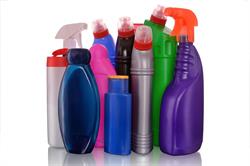 Consumer demand for and adoption of refillable containers is a growing trend in the U.S., with an increasing number of manufacturers and retailers launching their own products in refillable containers and refill systems. For example, SC Johnson’s Windex has launched cleaning concentrates that dissolve in water, while Dove has been selling a deodorant stick that fits into a reusable case. Beauty retailer The Body Shop has added refill stations to half its U.S. locations and Grove Collaborative has introduced concentrated surface cleaners that can be used with its reusable spray bottles.[Image Credit: © Dmitriy from Pixabay]
Consumer demand for and adoption of refillable containers is a growing trend in the U.S., with an increasing number of manufacturers and retailers launching their own products in refillable containers and refill systems. For example, SC Johnson’s Windex has launched cleaning concentrates that dissolve in water, while Dove has been selling a deodorant stick that fits into a reusable case. Beauty retailer The Body Shop has added refill stations to half its U.S. locations and Grove Collaborative has introduced concentrated surface cleaners that can be used with its reusable spray bottles.[Image Credit: © Dmitriy from Pixabay]
Experts Say Consumers Will Demand More Product Transparency
.jpg&width=250&height=188) By 2035, consumers will expect expanded transparency on the whole lifecycle of the products they purchase. According to a panel of experts at the 2023 Sustainability Next Summit, hosted by Dow and Fast Company, digital technology-enabled tools are helping speed up the coming of such transparency. Also, companies need to work closely with each other to ensure the adoption of industry sustainability standards and work toward bridging the gap between strong consumer desire to adopt sustainability and the low rate of consumers actually recycling and other sustainable actions.[Image Credit: © Franki Chamaki on Unsplash]
By 2035, consumers will expect expanded transparency on the whole lifecycle of the products they purchase. According to a panel of experts at the 2023 Sustainability Next Summit, hosted by Dow and Fast Company, digital technology-enabled tools are helping speed up the coming of such transparency. Also, companies need to work closely with each other to ensure the adoption of industry sustainability standards and work toward bridging the gap between strong consumer desire to adopt sustainability and the low rate of consumers actually recycling and other sustainable actions.[Image Credit: © Franki Chamaki on Unsplash]
INNOVATION & TECHNOLOGY
Textile Designer Uses Waste Onion Skins To Make Plastic Packaging Alternative
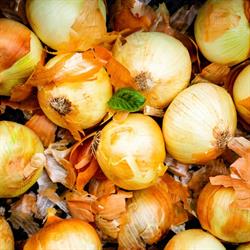
Renuka Ramanujam, a textile designer, has developed packaging material made from onion skins. She named the new material, Huid, Dutch word for “onion skin”, and has proposed it as a plastic packaging alternative. While Ramanujan is keeping some of the proprietary manufacturing process a secret, Huid is made in part by boiling ground waste onion skins and binding them with a casein-based adhesive.[Image Credit: © James Lee on Unsplash]
RESEARCH
University Researchers Develop Process For Turning Plastic Waste And CO2 Into Fuel
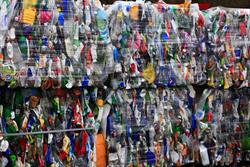 University of Cambridge professor of energy and sustainability, Erwin Reisner, and his team have developed a solar-powered process that can convert plastic and carbon dioxide into syngas. Aside from producing syngas, which is the most important component of sustainable fuels, such as hydrogen, the process also produces glycolic acid, which is widely used in the cosmetics industry. The process works by combining catalysts, chemical compounds that speed up a chemical reaction, into a light absorber.[Image Credit: © Nareeta Martin via Unsplash]
University of Cambridge professor of energy and sustainability, Erwin Reisner, and his team have developed a solar-powered process that can convert plastic and carbon dioxide into syngas. Aside from producing syngas, which is the most important component of sustainable fuels, such as hydrogen, the process also produces glycolic acid, which is widely used in the cosmetics industry. The process works by combining catalysts, chemical compounds that speed up a chemical reaction, into a light absorber.[Image Credit: © Nareeta Martin via Unsplash]
Study Claims PET Bottles Hurt Environment Less Than Glass And Aluminum
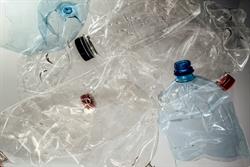 PET bottles are less harmful to the environment than aluminum and glass containers, according to the National Association for PET Container Resources. Results of the study by NAPCOR in partnership with Franklin Associates revealed that a 16.9-ounce PET bottle requires 80 percent less energy to be manufactured, compared with a 12-ounce aluminum can. Also, a PET bottle creates 80 percent less solid waste, uses 53 percent less water during production, and has 74 percent lower global warming potential. The life cycle assessment also highlighted that PET bottles generate 68-83 percent less emissions that contribute to acid rain and smog formation.[Image Credit: © Teslariu Mihai on Unsplash]
PET bottles are less harmful to the environment than aluminum and glass containers, according to the National Association for PET Container Resources. Results of the study by NAPCOR in partnership with Franklin Associates revealed that a 16.9-ounce PET bottle requires 80 percent less energy to be manufactured, compared with a 12-ounce aluminum can. Also, a PET bottle creates 80 percent less solid waste, uses 53 percent less water during production, and has 74 percent lower global warming potential. The life cycle assessment also highlighted that PET bottles generate 68-83 percent less emissions that contribute to acid rain and smog formation.[Image Credit: © Teslariu Mihai on Unsplash]
OTHER NEWS
2020-21 Recycling Rate For English Households Stagnated At 44%
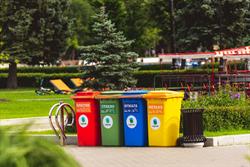 In England, the total amount of waste recycled increased by 2.7 percent from 9.9 million tonnes in 2020 to 10.2 million tonnes in 2021. Data from the UK Department for Environment, Food and Rural Affairs revealed, however, that household recycling rates virtually stagnated, recording a 0.1 percentage point increase from 44.0 percent during the same period. Also, the amount of dry material recycled rose 1.7 percent, or 0.1 million tonnes, to 6 million tonnes.[Image Credit: © Vlad Vasnetsov from Pexels]
In England, the total amount of waste recycled increased by 2.7 percent from 9.9 million tonnes in 2020 to 10.2 million tonnes in 2021. Data from the UK Department for Environment, Food and Rural Affairs revealed, however, that household recycling rates virtually stagnated, recording a 0.1 percentage point increase from 44.0 percent during the same period. Also, the amount of dry material recycled rose 1.7 percent, or 0.1 million tonnes, to 6 million tonnes.[Image Credit: © Vlad Vasnetsov from Pexels]
Survey Reveals Most UK Businesses Not Ready For EPR
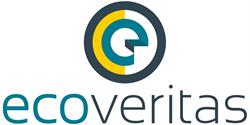 In the U.K., 86 percent of businesses have not fully established yet their packaging data collection processes as the Department for Environment Food and Rural Affairs is set to deliver Extended Producer Responsibility in 2024. Results of the latest survey by the environmental compliance data consulting firm Ecoveritas also showed that 85.7 percent of respondents expressed concerns about the financial impact of policies on their businesses, 42.9 percent are aware of the changes coming in 2024 but are unprepared, and 14.3 percent admit they are unprepared. [Image Credit: © Ecoveritas Ltd.]
In the U.K., 86 percent of businesses have not fully established yet their packaging data collection processes as the Department for Environment Food and Rural Affairs is set to deliver Extended Producer Responsibility in 2024. Results of the latest survey by the environmental compliance data consulting firm Ecoveritas also showed that 85.7 percent of respondents expressed concerns about the financial impact of policies on their businesses, 42.9 percent are aware of the changes coming in 2024 but are unprepared, and 14.3 percent admit they are unprepared. [Image Credit: © Ecoveritas Ltd.]
Copyright 2026 Business360, Inc.

